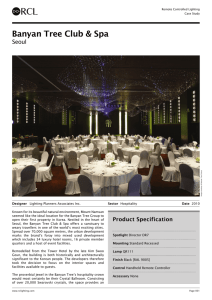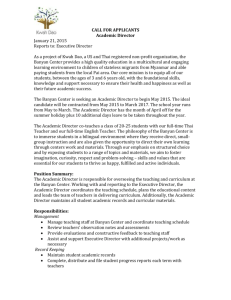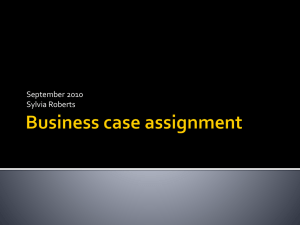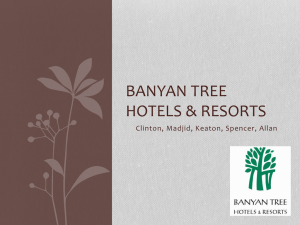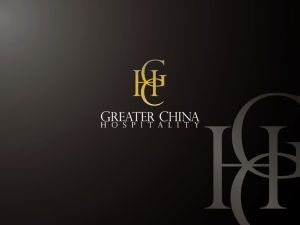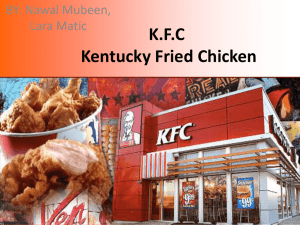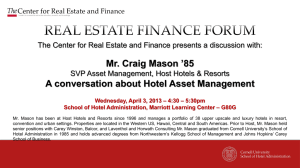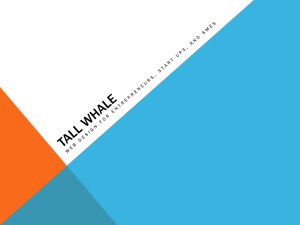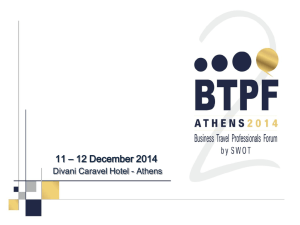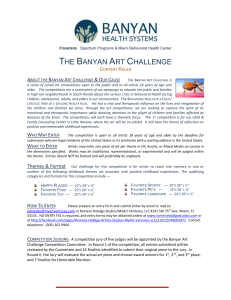banyan_tree_powerpoint_aziz_ayman
advertisement
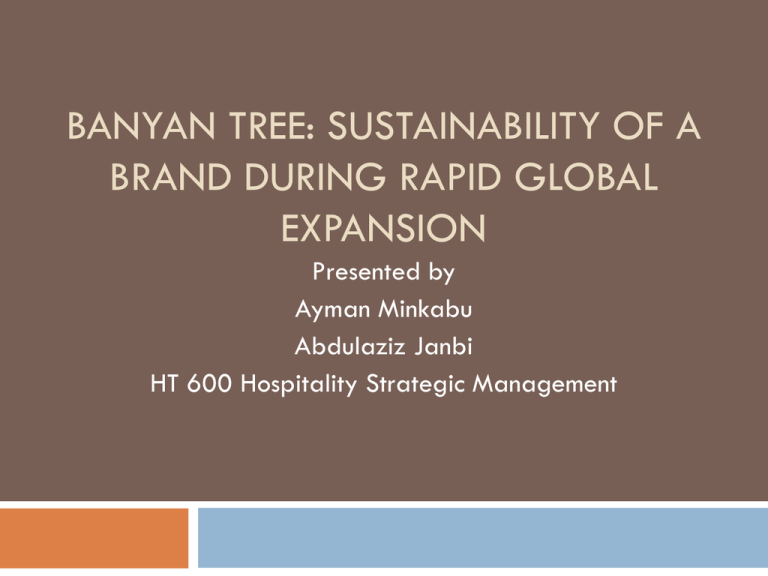
BANYAN TREE: SUSTAINABILITY OF A BRAND DURING RAPID GLOBAL EXPANSION Presented by Ayman Minkabu Abdulaziz Janbi HT 600 Hospitality Strategic Management Introduction https://www.youtube.com/watch?v=FAEUUNvO5DE Introduction Banyan Tree Holdings Limited A leading manager and developer of premium resorts, hotels and spas (Asia-Pacific region) 35 hotels and resorts 72 spas 90 retail galleries 3 golf courses in 27 countries Expansion plans for the future. Business & Brands Business (management, development and ownership of H&R with interesting in a niche market) What has occurred in the case Established in 1992 as a family business Headquarters (Singapore) 1st resort opened in Phuket, Thailand(1994) Brand targeted high end travelers Brand building to be sustainable in the global marketplace Disasters e.g. Asian Financial crisis 1997, SARS 2003, Tsunami 2004 What has occurred in the case The need to diversify risks across geographic regions. IPO (Initial Public Offering) 2 challenges - Adequate labor & infrastructure - The danger of brand dilution +400 awards and accolades by 2006 Closest Competitors The Environmental Analysis The broad environment (PEST) Political Influences: - involved in a little part - affected by various local laws related to: (construction, ownership rights, and taxes) - e.g. Thai Law - e.g. China The Environmental Analysis Economic Influences: - large influence on the business - e.g. tax rate, stability of economy, exchange rate, crisis and disasters such as Asian Financial crisis 1997, SARS 2003, Tsunami 2004 The Environmental Analysis Social Influences: - People’s lifestyle, culture, tradition, size of the population and education - BT focus on these factors - physical and human environment (associated with brand) - corporate social responsibility (CSR) - Green Imperative Fund 2001 “program”. The Environmental Analysis Technological Influences: - BT responds very quickly to new update technology, e.g. high usage of internet - possesses a world-class IT infrastructure in Maldives The Environmental Analysis Industry Analysis (Porter’s Five Forces) Bargaining power of suppliers: Low - operation relies upon (local resources) - maintain the relationship with the suppliers - most of countries (lower cost) - easier for BT to substitute suppliers The Environmental Analysis Bargaining power of customers: Moderate - Sanctuary for the Senses (brand & location) - corporate social responsible (CSR) “positive” - brand identity = high bargaining power towards customers - Other companies may create strong branding with strong service + unique experience “Negative” • The Environmental Analysis Threat of new entrants: Low - high capital required to support business operations - e.g. 1st resort in Laguna Phuket cost $200 mill - difficulty to find suitable locations The Environmental Analysis Threat of substitute: Moderate - easy to find similar distinct services and amenities - depends on the guests (budget) The Environmental Analysis Competitive Rivalry: high - New hotels competed for the same customer segments in locations (BT) - e.g. JW Marriott (Phuket) - competitors (different location + same facilities and amenities) The Environmental Analysis Key success factors - Established Brand - Corporate Social Responsibility CSR - Good service quality & unique selling - Strong management team Organizational Resource Analysis Strategic Direction Vision Statement “To build in its brands, Banyan Tree and Angsana, to create a diversified group of niche resorts and hotels in strategic locations throughout the world, which would be a complemented by residence and property sales, spa and gallery operations” Organizational Resource Analysis Mission Statement “We want to build globally recognized brands which by inspiring exceptional experiences among our guests, instilling pride and integrity in our associates and enhancing both the physical and human environment in which we operate, will deliver attractive returns to our shareholders” Organizational Resource Analysis Values “Banyan Tree defines success not just financially, but also socially and environmentally. Sustainable development as a socially responsible business is a core value of the Group” Organizational Resource Analysis strategic direction has changed over the time. - disasters & crisis - need to diversity risks across geographic regions - need to expand the venture outside familiar territory Organizational Resource Analysis Internal Environment - Hotel 50-100 rooms - Employees +8000 - Revenue in 2013 $356.1 million - growth 2-5% last 5 years Organizational Resource Analysis Business Model (7 segments) 1- Hotel investment 2- Hotel management 3- Spa operation 4- Gallery operation 5- Hotel residences 6- Property sales 7- Design & other services Board of Directors of Banyan Tree Holdings Limited Ho kwon ping Executive Chairman & his wife, Claire Chaings, Senior VP of the retail & merchandising arm Ariel P Vera Non-Executive & NonIndependent Director Chia Chee Ming Timothy Lead Independent Director Organizational Resource Analysis Performance evaluation Vision and Overall Strategy: “Becoming global has always been part of our vision because a long-term, sustainable Business requires that we grow our re venue base and diversify worldwide.” It has always been Banyan Tree’s vision to be a global business with a string of Properties strategically spread around the globe. Greater breadth and depth globally- Strategic geographic expansionExpand into low cost locations Close to key customer markets. Vision of being global brands articulated in many places in Pieces. Overall business strategy also not clearly articulated. Summary of Situation Analysis (SWOT) Analysis Strengths 549 ha land bank that is spread over Phuket, the Seychelles, Vietnam, Lijiang and Lhasa Integrated business model Strong Brand Recognition Integrated capabilities- including in-house design, project management and centralized marketing Reduced time needed to launch new offerings 7000 people from 50 nationalities BTH Management Academy 4 Spa training facility with capability to turn out 200 therapist a year Low cost operating environment Experienced, qualified management team Summary of Situation Analysis (SWOT) Analysis Weaknesses High dependence on Thailand business~60% of the total revenue Many small business like Hotel Residences, Spa Operations, Gallery Sales, Design Fee & Others Overlapping Businesses in Property Sales and Hotel Residences Heavy Administrative Cost Structure (14% of revenue in 2008) High Financing Cost ~4% of revenue Poor operating margins in Hotel Management, Spa Operation and Gallery Sales businesses Lower occupancy of Angsana vs. Banyan Tree Hotels Summary of Situation Analysis (SWOT) Analysis Opportunities Property Development and sales in Seychelles, Vietnam and Lhasa. Aggressive growth in spa operations and Hotel Management. business within existing fixed cost structure. Merge Gallery Operations with Spa Operations to improve the operating margins of both businesses. Merge Property Operations and Hotel Residences into one Business Unit. Optimize the Administrative Infrastructure Strengthen Angsana Brand. Summary of Situation Analysis (SWOT) Analysis Threats Global Recession. Continued Political Turmoil in Thailand. Season and Cyclical Fluctuations. Country specific event risks like terrorism, epidemics and natural. disasters, especially in Thailand like Tsunami in 2004 end. Developing the Strategic Plan Strategic Direction & Major Strategies Formulation of a clearer Company Vision: ¾ Will provide a more coherent and clear direction to all the people in the company. ¾Channel the efforts of the all the people in same direction ensuring better execution of the plans. Formulation of R&D Strategy ¾Ensure that R&D efforts are aligned with other functional strategies and aims to deliver the company goals. Developing the Strategic Plan Review of Divisional Strategic Planning Process: ¾Will ensure that the longer terms goals like that of 2011 are more attainable. ¾Exploit the growth potential of smaller but strategic segments like Spas. Developing the Strategic Plan Formulation of a Organizational Strategy: ¾Will ensure that the organization structure is optimally designed for the company. ¾Improved the cost structure of the smaller divisions and overall company. Developing the Strategic Plan Review of Brand Development Planning Process for Angsana ¾Will improve the revenue and occupancy of the Angsana hotels. Developing the Strategic Plan Evaluation of Opportunities & Recommendations supporting the local communities and businesses. Recycling water. community development and supporting environmental projects. Developing the Strategic Plan Implementation & Control collaborate with a restaurant, because it was reported that such JV happened before (Frumkin 2000). Implementation BTH has selected Vabbinfaru resort in Maldives to kick-start the joint-venture with Guy Savoy in year 2014. This particular resort was selected due to its prime location in Maldives, and it will be available for receiving dining guests from Banyan Tree Madivaru and Velavaru. The staff training will be handled by Guy Savoy. The restaurant will be open for lunch and dinner. The chefs are expected to greet the diner and find out personal preference of how they like their meal to be cooked. Conclusion Sustainability is an important factor to the progress of a company. However, it requires appropriate assessment of the environment and setting up adequate strategies that will ensure that the company competitiveness is enhanced. As such, Banyan Tree has indicated the best ways in which it can ensure that it manages to go through the rapidly changing and growing environment. It aim has been ensuring that it embraces diversity and sustain quality of its service to its customers. In spite of these endeavors, the critical thing has been to maintain its culture, ethics and standards of its operation, thereby growing to remain relevant and competitive within its industry. Thanks
